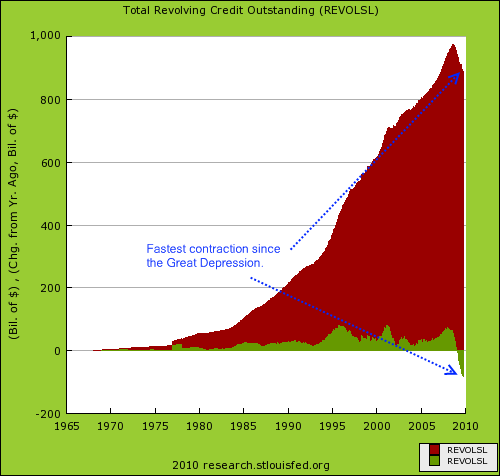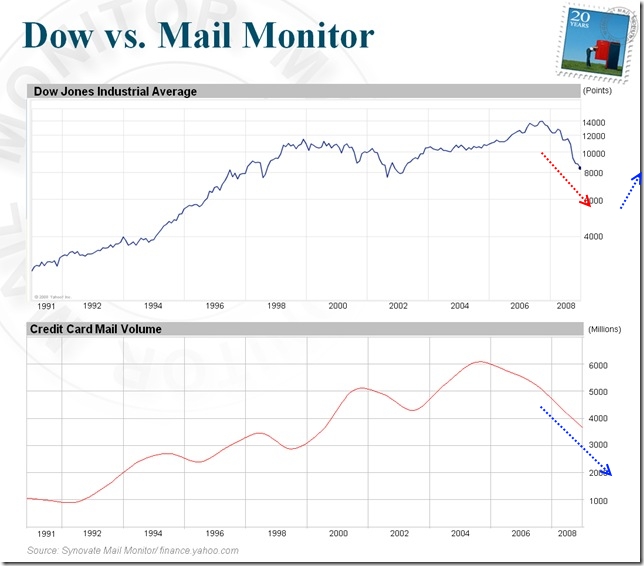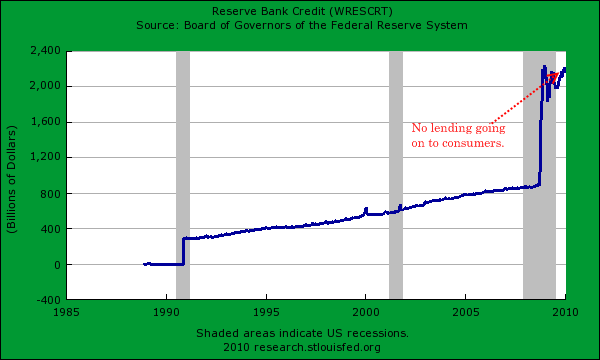Credit Card Companies Pulling Back Credit Offers to American Households: Those Zero Percent Offers have now Turned into 30% Offers with Annual Fees. Banks have over $2 Trillion in Excess Reserves yet are unable to Offer a Decent Credit Card Rate.
- 7 Comment
Credit cards are ubiquitous like air in the American economy. Virtually every American that can qualify for a credit card has one (or many) in their wallet. Credit card companies have flooded the market with millions of plastic rectangles that have now come back to bite many American consumers. If we rewind back to the early days of this crisis, (so much has happened since that time) we will remember that the banking bailout involved some necessity of keeping credit alive. At least this is how it was presented to the American public. No bailout equaled no access to credit. Yet since that time we have seen consumer credit simply collapse on a record pace. Part of this is due to the extinguishing of debt via bankruptcy but also the fact that credit card companies (aka big banks) are not making loans accessible to the public.
Now banks have shifted gears and are playing on the average American’s need for credit access in a troubled economy. The American consumer is the clutch of this economy and it is burned out. Banks are now saying that they need to be prudent because that is what led them into this mess in the first place. Correct. But that was not the pretense for the bailouts. Now that they have trillions in taxpayer money they have now found some sort of financial religion:
Credit card debt is contracting at its fastest pace since the Great Depression. In fact, over $17 billion in consumer credit was yanked from the market last month. And you don’t need to know the hard data coming out of the Federal Reserve to know this.  Just look at your weekly mail:
Source:Â Paul Kedrosky
And of the offers, good luck finding any of those 0 percent offers for 12 months with no fees. Now offers that you get in the mail come with onerous terms, multiple pitfalls, and annual rates that would make your local payday lender look like a generous Midwest banker. Credit card companies are now putting the vice grip on the heads of good paying customers since many of their other “subprime” borrowers are defaulting in mass. Keep in mind these are the borrowers they so heavily recruited during the bubble. After all, we are talking about an industry that gave a cat a $4,000 credit card offer.
During the boom, I would get 3 to 4 offers per day regarding credit cards. Now, it is more like 3 to 4 in a month and the offers are horrible. And the above chart shows that volume has fallen in tandem with the stock market. But unlike the recent stock market rise, credit card offers are still being yanked from average Americans:
“(Synovate) A significant proportion of credit card accounts are being closed, either by issuers or by the consumers themselves due to the change in terms proposed by issuers,” said Anuj Shahani, Director of Competitive Tracking Services for Synovate’s Financial Services Group.
“This was inconsequential initially as issuers were mainly cutting lines on inactive accounts or for transactors, people who pay their balance in full each month. Recently, we are seeing many issuers reduce credit lines on active accounts or for revolvers, people who do carry a balance each month. This can put many households in a risky situation,” he added.
For example, if a household with $25,000 in credit lines across all their cards has one of their $10,000 limit cards cancelled, the credit limit for the household is reduced to $15,000. If they were to revolve on one card with $5,000 as an outstanding balance, their utilization ratio (ratio of outstanding balance to available credit limit) increases from 20% to 33%.
“A utilization ratio above 30% is considered risky by the industry and this makes the household a credit risk in the eyes of most issuers, potentially triggering further reductions in their existing credit limits, making matters even worse,” said Shahani.”
I can tell you from personal experience that this happened to me. One of my credit cards had an excellent fixed rate (something that seemed permanent during the boom times) at 4.99%. Clearly this was a fantastic deal and for years, I kept this card for random purchases. The limit on this card was $5,000 and I rarely put over $1,000 on it. Well all of a sudden once the banks received their bailout money, I get a message saying they are raising their rate to 19.99% because of “adverse changes in the economy” and they needed to be more careful. Very quickly I picked up the phone and called up the number to say I object to the new terms.
Well after being transferred halfway around the world, I thought all was done. A week later I get a letter telling me my account is closed because of my objection to the new terms. So much for that “permanent” 4.99 percent rate. And you would think that banks have no money to lend right?
Banks are holding over $2 trillion in excess reserves. This is taxpayer money funded through the Federal Reserve and U.S. Treasury. What this actually tells us is that banks are gearing up for more internal problems like the $3.5 trillion implosion of the commercial real estate market or rising defaults. Currently banks have made massive profits by gambling with taxpayer money in the stock markets. The spigot to the consumer is nowhere to be found.
The troubling issue as well is that by closing accounts down debt ratios shoot up and impact credit scores. So by closing down an account, a prudent move on the surface, may actually hurt your overall credit score. And FICO scores carry a lot of weight and unjustifiably so.
But surely those that are getting credit card offers are being given generous terms since banks have been saved by taxpayers:
“Many new card offers now carry an annual fee (30% of the offers in Q3 2009 carried an annual fee versus 28% in Q2 2009). A recent Consumer Confidence Survey conducted by Synovate reported that 15% of consumers said they’d cancel all their credit cards if charged an annual fee and 38% said they’d keep only one card or cancel the ones they don’t use. Another 24% of consumers would look for a card with a lower fee and the rest would take no action.
“Whenever you have a situation where less than a quarter, at best, of customers feel secure, and the rest are either in the process of cancelling their cards or intend to find a new one, it’s reasonable to conclude that the credit card situation remains dire,” Shahani added.”
Not at all. Banks can borrow from the Fed at zero and lend out money at ridiculous rates. Massive margin gains. How else are banks making record profits while unemployment is near the peak and average American are seeing their salaries being slashed?
If you add up the numbers, banks are creating a new debt serfdom for Americans. They are foreclosing on homes at a record pace and pulling back credit even though they explicitly stated that the bailouts were to help the housing industry and keep credit alive. The only housing loans they are making are government backed loans (i.e., Fannie Mae and Freddie Mac conforming)! They won’t even dare put their own money (your money) at risk anymore if they don’t have a government guarantee. With credit cards, it is their money and here they are yanking it all back. This is the plight of our current economy.
If you enjoyed this post click here to subscribe to a complete feed and stay up to date with today’s challenging market!7 Comments on this post
Trackbacks
-
forty2 said:
Well, the solution is to stop piling up debt on plastic. Find a fee-free card and pay it off monthly if you use it.
Other than for emergencies (and you don’t have an emergency fund or it’s too small) nobody should ever revolve debt on a credit card. I know, easier said than done, but I manage.
January 19th, 2010 at 5:08 pm -
Muhammad said:
Hi there mybuget360. Some very good research here but there is one main error. The US and western model banks do not have “excess reserves” at present. In fact the only way that a bank could have such a situation is if deposits were leveraged at 1:1 and less than 100% was loaned out/apportioned. Also, the cost of bank and FI bailout to the US taxpayer is around US$ 11 trillion so far and it has been the biggest waste of tax payers money ever. A lot of interesting financial detail and comments can be found in some of the audio files at http://www.iamthewitness.com
January 19th, 2010 at 7:15 pm -
Tristan said:
Another fantastic post from 360. This is one of the most intelligent, timely and relevant sources of financial news analysis on the Net. While most of the big players focus on the dealings of the 900 lb gorillas, here we read about us “little people” who are, as a matter of fact, collectively responsible for supporting those gorillas.
One suggestion: Please make it easier to learn about who is writing these posts. There’s no bylines nor an “about us” section. Let’s keep things transparent!
January 20th, 2010 at 11:49 am -
Tristan said:
Oh, and as for this post, I’ve been facing the exact same issues for the last few months. For example, I get a notification from one of my credit card companies—one that I’ve been making regular payments on for years and have never been late—that they’re jacking my APR from 6.9 to 19.99 percent. WTF OMG !@$%!
So I call them and it looks like my only choices are to accept the new terms, or close the account and continue to make payments at the 6.9% rate. Of course, I close it.
But now it looks like my utilization ratio has just decreased. (I wasn’t aware of this concept until reading this post, thank you.) Screwed either way.
I’m wondering how this behavior relates to impending changes to lending laws…
January 20th, 2010 at 11:54 am -
DP said:
Hi all – a CC company that starts with the letter D pulled this on me, and I said that I’d close the account unless they could do something for me.
They gave me a 6 month 0% interest rate…try it it’ll give you a few months to pay off the cards at least.
-DP in PGH
January 21st, 2010 at 6:51 pm -
Deborah McQueen said:
Not sure if this is helpful to anyone. But most credit card companies are now offering reduced interest rates for one year. Also, some are offering a match payment program – you pay up two payments and they pay the third. Also, there are skip a payment programs. Much of this has come about in response to Obama’s credit card enforcement act which goes into effect Feb. 23. Some companies got off to an early start with letters to consumers after the new year…however, watch out on the flip side – they are raising bank fees.
January 22nd, 2010 at 1:24 am -
Mark S. Hankins said:
Both Moody’s and Fitch predict credit card chargeoffs to run at 11% or more through the summer. Just as in the Advanta Bank scenario, these unsustainable chargeoff rates will destroy any of the pure-play credit card banks that are caught in the situation, and they will force other banks to either cut loose the losing credit card operations or subsidize their wind-down with profits from other operations.
Consumers should consider simply revolting: not paying 30% rates. There’s your bailout for Main Street right there. Do you think they can sue a large enough percentage of consumers in a situation where courts are underfunded and understaffed and collections attorneys are already tied up with the mortgage crisis? Heck the biggest credit card collections firm, Mann Bracken JUST WENT BELLY UP. What does that tell you? My book is called “Debt Hope: Down and Dirty Survival Strategies” and for a limited time you can read it free on scribd.com.
January 24th, 2010 at 8:09 pm



